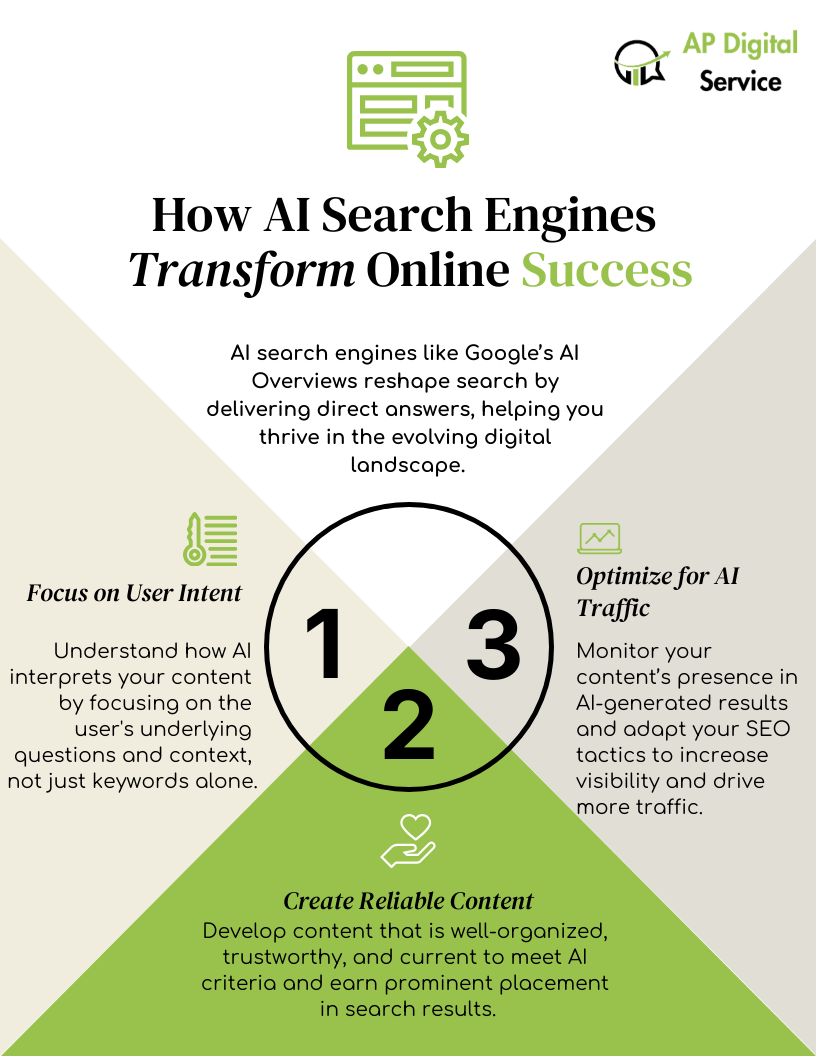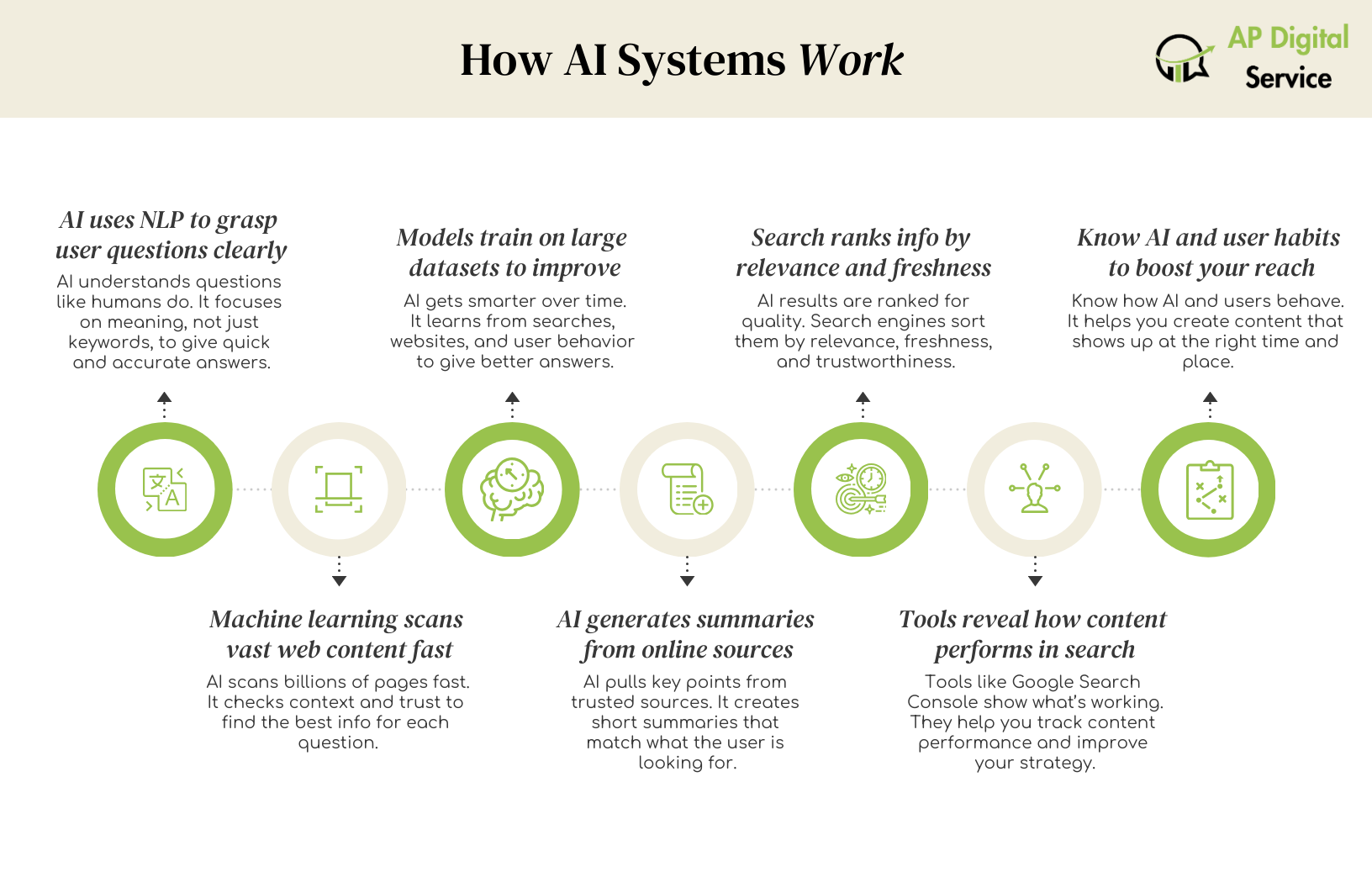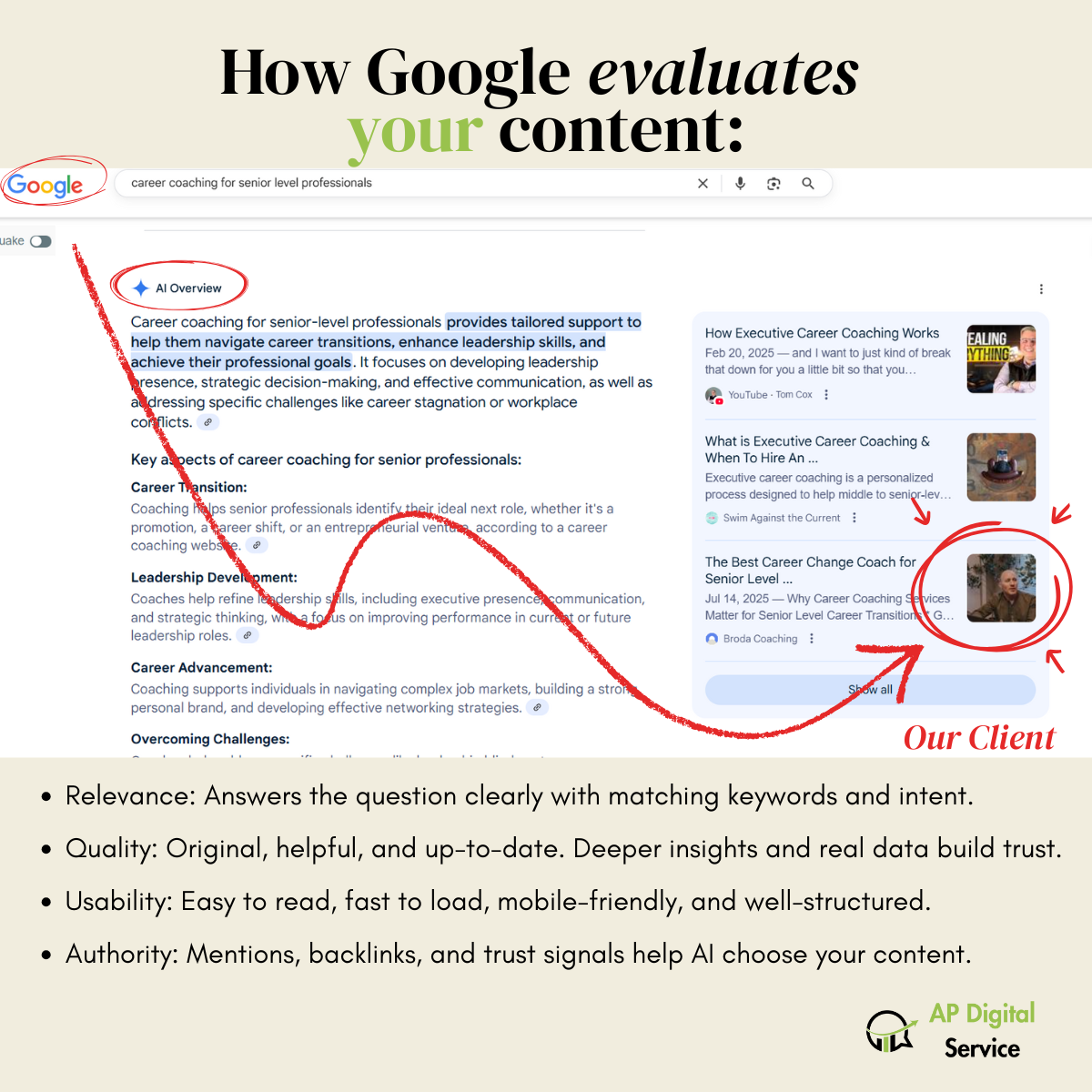How to Show Up in AI Search Results
TL;DR
- Clear answers win. AI search engines love short, specific responses that directly answer user questions.
- Structure matters. Bullet points, headings, and schema markup help AI understand your content quickly.
- Fresh content gets noticed. Regular updates keep your information relevant and boost visibility.
- Experience shows. Our simple formatting strategy helped clients land next to TIME and Forbes in AI results.
- Authority is earned. Avoid shortcuts, AI looks for trusted, well-sourced, human-enhanced content. Relevant, timely content that helps real people gets surfaced more often.
What Are AI Search Engines?
AI search engines like Google's AI Overviews are transforming the internet search experience. Instead of listing websites, they now generate answers directly in the search results using artificial intelligence. These answers come from scanning web content and summarizing it.
Unlike traditional search engines that prioritize links and keywords, AI search engines focus on intent and context. They rely on advanced technologies like natural language processing (NLP), machine learning, and large language models to understand user questions more deeply.
This allows them to deliver concise answers directly on the search results page, often in the form of AI-generated summaries or featured snippets.

With the rise of AI-driven searches, platforms like Google Search now favor content that clearly addresses user needs. These AI features, like Google's Knowledge Graph and AI Overviews, scan a wide range of web sources and reward content that is structured, reliable, and up to date.
AI Overviews are Google's AI-generated summaries that appear at the top of search results. They provide quick answers pulled from multiple sources. AI Overviews now appear for nearly 47% of organic searches, significantly changing user engagement with search results.
How to succeed in this new landscape
Coaches and content creators must focus on AI search optimization: crafting content that not only ranks well but also gets selected for AI-generated content blocks that appear in Google and other AI-powered searches. Tracking AI visibility is crucial for adjusting your SEO strategy due to its impact on traffic. (Keep reading to learn how to do this.)
Why AI Search Matters for Visibility
When we first started optimizing content, we focused on traditional SEO, just making blogs really helpful, skimmable, and easy to understand. We added bullet points, wrote "how-to" posts, and always tried to be actionable.
What we didn’t realize at the time was that this focus on being clear and having content that was usable was laying the groundwork for AI search visibility. It was only later that we discovered that by structuring content this way, we had accidentally cracked a formula that helped our content (and our clients' content) get picked up by AI as "The answer."
If your content isn't being read and summarized by AI systems, you're missing out on major visibility. Plain and simple.
With features like Google's AI Overviews and featured snippets, people often get what they need without clicking away. That means your content must be designed to be quoted directly in those answers.
AI search visibility is no longer just about ranking #1 on the page; it's about being chosen by AI to answer user questions directly. This shift means that your content must be optimized for AI search results, not just traditional search rankings, if you want to be found.
Because zero-click searches are on the rise, where users get what they need without clicking through to a website, being featured in AI Overviews, featured snippets, and Google’s Knowledge Graph becomes critical for staying relevant and discoverable.

Businesses and content marketers who understand this and adapt by producing valuable content with structured data, direct answers, and how-tos will see a significant boost in their brand’s visibility. Incorporating tools like Google Search Console, Advanced Web Ranking, and generative AI tools allows you to measure and improve your performance in these AI-powered search environments.
So, if you're not optimizing for AI search engines, you're not showing up where users are actually finding their answers.
How AI Systems Work (In Simple Terms)
- AI uses natural language processing (NLP) to understand what people are asking. This means it can interpret the meaning behind a question, not just match keywords.
- Then, machine learning algorithms scan billions of web pages to find the most relevant and trustworthy content. They weigh context, clarification, and structure when selecting answers.
- These AI models are trained on massive datasets, often from search queries, web sources, and user behavior, to improve their ability to deliver helpful responses continually.
- When a user performs a search, the AI system draws on this training to generate an AI-generated summary or featured snippet from existing online content.
- Search algorithms rank this information based on factors like relevance, freshness, and authority.
- Tools like Google Search Console and Google Analytics give content marketers insight into how their pages perform in search engines.
Fun Fact: 60% of Google searches never left the search engine results page
in 2024.
By understanding how AI systems work and your audience's changing behavior, you can better structure content so it appears in the right place at the right time. This helps both users and search engines find value in your expertise.

How to Create Content That Appears in AI Search Results
- Provide direct answers. Write short, clear responses to common questions in your field. These direct answers make it easy for AI to extract and present your content as a response in AI Overviews or featured snippets.
- Use structured formatting. Bullet points, numbered lists, bold subheadings, and concise paragraphs improve readability and help AI understand the structure and intent of your content.
- Implement structured data. Adding schema markup to your pages allows AI search engines to interpret the purpose of your content, boosting your eligibility for rich results and AI-generated content features.
- Keep content up to date. AI systems prioritize current and accurate content. Regularly update posts, include recent statistics, and align your language with emerging search behavior and user questions.
- Be concise and relevant. Avoid keyword stuffing or vague filler. Focus every section of your content on addressing specific user intents. The clearer and more helpful your writing is, the more likely it is to surface in AI search results.
- Include 'how-tos' and FAQs. Google favors content that breaks down steps or answers niche questions directly. These formats match what users search for and what AI is trained to highlight.
- Optimize for readability. Use plain language, short sentences, and logical flow. AI systems favor content that’s easily scannable and valuable to a broad audience.
- Repurpose podcast and video content into summaries. If you create long-form media, summarize key takeaways into blog posts or bullet lists. These are easier for AI to scan and use.
- Add internal definitions for niche terms. When using jargon, explain it briefly in parentheses or footnotes. This helps AI understand your topic and serve it to users with less background knowledge.
- Use consistent headings for recurring formats. If you regularly publish reviews, recipes, tutorials, or comparisons, use the same headings each time (like "Step-by-Step Instructions" or "Pros and Cons"). AI recognizes this pattern and associates it with quality responses.
- Incorporate real questions from your audience. Use tools like Google Search Console or community feedback to identify actual questions your readers ask, then write a clear, direct answer to each one.
AI Search Optimization Strategies
Once we leaned into this method intentionally, we started seeing big results. Our own blog content and our clients' content started showing up alongside sources like TIME and Forbes. One of our clients even had their entire coaching program page summarized by AI.
We’ve seen a rise in citations, sourcing, and inclusion in AI Overviews and featured snippets just by focusing on structured, helpful, skimmable content. AI search optimization builds on traditional SEO strategies by structuring your content for how AI systems evaluate, summarize, and display results.
Here's how to do it effectively:

- Combine traditional SEO with AI search optimization. Start with core SEO basics, keyword research, internal linking, and page speed, but adapt your structure to prioritize clear, concise information that AI can easily extract.
- Use tools like Google Analytics, Google Search Console, and Advanced Web Ranking sites. These platforms help you monitor your search visibility, track user questions, and identify pages that show up in AI Overviews.
- Optimize for answerability. Create content that sounds like a great response to a specific question. Use a conversational tone and aim to provide concise answers within the first few lines of a section.
- Use AI-generated content carefully. Tools like ChatGPT or Jasper can help you draft outlines or ideas, but always add a human touch. Include your expertise, data, or client stories to make it more authoritative and quotable.
- Incorporate user-generated content. Encourage reviews, testimonials, or community feedback that answers common questions. These inputs help your pages show up in broader web sources scanned by AI.
- Audit your schema markup. Structured data tells AI what your content is, not just what it says. Use FAQ, How-To, and Article schema to help search engines categorize your page accurately.
- Leverage your Google Business Profile. If you're a local business or brand, update your listings frequently. AI tools use this profile as a trusted source of entity data.
- Focus on evergreen content. Pages that answer fundamental questions or solve persistent problems are more likely to be cited in AI-generated summaries.
- Analyze and adapt. Review how your content appears on the search results page. If it's not surfacing, test new formats, like adding bullet points, breaking long paragraphs, or answering more direct questions.
These AI search optimization strategies make your content more visible, more quotable, and more useful, exactly what AI systems are trained to prioritize.
Best AI Tools to Use
- Google Search Console: See how often your pages appear in AI Overviews. (Higher impressions with lower clicks)
- Google’s Knowledge Graph: Boosts your authority in AI search engines. (Must have Google Business Profile)
- Advanced Web Ranking: Tracks keyword performance in AI features. (Take these scores with a grain of salt)
- Generative AI tools: Speed up the creation of valuable, optimized content. (Always human edit)
- Google Business Profile: Increases your visibility in local and brand-related AI results. (Local businesses should post regularly)
Key AI Features That Influence Visibility
- AI Overviews: Automatically summarize web content for fast answers.
- Featured Snippets: Highlight the most relevant snippet of text from your page.
- Zero-click searches: Provide answers right on the search results page.
- Search visibility: Your goal is to be the source quoted in these features.
How Google Ranks Content in AI Search
Google’s AI uses a combination of search algorithms, natural language processing, and machine learning to determine which content is shown in features like AI Overviews, featured snippets, and other AI-driven elements in the search results page.
Here's how it evaluates your content:
- Relevance to the user query: Google analyzes whether your content directly answers what a person is searching for. Clear headlines, matching search intent, and keyword-aligned sections make a big difference.
- Content quality: Your content must be original, helpful, and up to date. Including recent data, expert commentary, and in-depth insights improves your authority. Avoid overly generic answers.
- Usability: The page should be easy to navigate, mobile-friendly, and fast-loading. A good content structure using bullet points, concise paragraphs, and meaningful subheadings makes it easier for AI to interpret and quote your material.
- Authority: AI looks at brand mentions, backlinks, and signals from Google’s Knowledge Graph. The more you are referenced as a trustworthy source, the more likely your content will be chosen by AI systems.

To monitor and improve your rankings in AI search, use Google Search Console to review your impressions-to-clicks ratio, track trends, and identify which pages are earning the majority of the impressions in AI-generated answers (these pages will often have an obviously inflated number of impressions). Then, update or restructure low-performing content based on this feedback to better meet AI standards.

Common Mistakes to Avoid
One of the most common things we see working with coaches and creators isn’t a mistake in the traditional sense; it’s simply a gap in knowledge. And we get it. You don’t know what you don’t know... until you do, ya know?
But the reality is, a lack of understanding around how AI systems evaluate authority can quietly undo a lot of the progress you've made.
We’ve seen creators collaborate with unvetted partners for backlinks or delegate content creation to VAs who use ChatGPT as their final draft. While these steps might seem efficient, they can seriously undermine your authority in the eyes of AI, and that means a steep drop in visibility.
Authority isn’t just built by publishing frequently. It’s built by being consistent, reliable, and cited from high-quality sources.
- Relying only on traditional SEO. While keywords and backlinks still matter, you need to create structured, scannable content that AI can quickly extract. Focus on providing direct, high-quality answers.
- Blindly publishing AI-generated content. AI tools are great for drafts, but always review and enhance them with personal insight, brand voice, and accuracy. AI tools pull information from the internet; if you don't insert your expertise, you aren't contributing to the conversation. You're recycling content that already exists.
- Ignoring formatting best practices. Long walls of text or vague headers confuse both people and AI. Use bullet points, clear subheadings, and short paragraphs to help AI summarize your content more easily.
- Letting content go stale. If your blog posts or pages haven’t been updated in a year or more, they’re unlikely to appear in AI-generated answers. Keep your most important pages fresh and relevant.
- Skipping schema markup. Structured data like FAQ schema or How-To schema helps AI systems understand and rank your content correctly. Schema speaks to AI in its own language and helps AI determine what your content is.
- Writing without a clear audience in mind. Content that tries to speak to everyone often speaks to no one. AI tools favor clear, targeted responses to specific user questions (queries), so write for your ideal reader.
- Ignoring analytics and feedback. If you're not checking Google Search Console or analyzing your search visibility, you're flying blind. Let data guide your optimizations for both humans and AI. We recently saw that AI surfaced our content for a keyword we did not intentionally choose, so we switched up our messaging and are now using that to our benefit.
Meet the Team Behind It All
If you've made it this far, you're probably serious about getting your content to show up in AI search results, and that's exactly what we help our clients do.
We're Peter and Amanda, the founders of
AP Digital Service.
We specialize in helping content creators, coaches, and online educators build long-term visibility with GEO (Generative Engine Optimization), SEO, and Evergreen content systems.

Our clients are established creators making a living online, but they're tired of being stuck in the social media grind. We help them scale beyond algorithms with custom optimized websites, evergreen content, and performance-focused AI visibility that gets real results.
We believe your content should work
for you, even when you're not online. That's why we focus on sustainable visibility, so you’re discoverable in Google, AI Overviews, and other AI-driven search tools without posting daily.
Want to work with us? If you're ready to turn your content into a visibility machine, we'd love to help. Reach out to explore how we partner with creators to build SEO and AI-optimized platforms that last.











